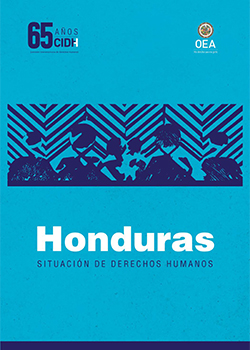
Press Release
IACHR Releases Report on the Situation of Human Rights in Honduras
May 15, 2024
Contact info
IACHR Press Office
Distribution List
Washington, D.C. – The Inter-American Commission on Human Rights (IACHR) is releasing the report Situation of Human Rights in Honduras. This report addresses conditions in the country based on an on-site visit conducted over the period April 24–28, 2023, and follows up on the Commission's latest country report on Honduras, published in 2019.
In recent years, Honduras has suffered several political and institutional crises that have deepened the complex human rights situation the current government found when it took office. The Commission acknowledges the government of President Xiomara Castro's commitment to making human rights one of the main pillars of its administration.
The report identifies the prevalence of a series of structural problems, including poverty, inequality, social, territorial, agrarian, and environmental disputes, and violence, which all combine and cross-sectionally affect human rights. The IACHR further notes the differentiated impact of this setting on specific groups which have for decades been prevented from fully and effectively exercising their human rights. This situation must be addressed.
The IACHR has been informed of several measures taken by the State to tackle these conflicts and wishes to stress that the effectiveness of any measures will depend on their support at the highest level and on the development of comprehensive policies to foster the required structural changes.
While the homicide rate has gone down, Honduras remains the most violent country in Central America and the country with the second-highest homicide rate in the Americas. This reduction in the homicide rate has focused on urban areas. It is yet to reach remote and rural areas where other factors are at play, like disputes over access to land, territory, and natural resources and the State's insufficient capacity to effectively control those areas.
Violence in Honduras is made worse by the significant presence of criminal organizations, particularly maras and other gangs. The Commission is concerned that Honduras has adopted, in response to this violence, a state of emergency that is being extended over time and that continues to engage the armed forces in law enforcement tasks, contrary to the State's initial commitment to demilitarizing its territory.
Violence has had serious consequences in the community fabric and has triggered other human rights violations, like forced displacement. Further, it continues to have a differentiated impact on certain groups. This report focuses on the situation of groups and individuals of particular concern, including women; children and adolescents; lesbian, gay, bisexual, trans, and intersex (LGBTI) persons; individuals who are deprived of liberty; indigenous and Afro-descendant peoples and Garifuna communities; individuals in human mobility contexts; older persons; and persons with disabilities.
The report further focuses on the risks faced by human rights defenders, particularly those who are active in defense of the environment and of land and territorial rights, as well as by journalists and social communication experts. In this context, the national protection mechanism faces various challenges that negatively affect its consistence and its ability to provide effective responses. The human rights situation of individuals who are deprived of liberty continues to be a matter of particular concern.
In Honduras, high levels of impunity persist, alongside a widespread mistrust in the institutions in charge of investigating crimes and prosecuting their perpetrators and masterminds. The IACHR encourages the State to continue to remove hurdles that prevent effective access to justice—including deficiencies in the material, human, and technical resources allocated to the public prosecutor's office—and to persist in its efforts to fight corruption.
Honduras completed the recruitment process to appoint new members of its Supreme Court of Justice. However, the process to appoint the new leadership at the Office of the Attorney General caused controversy. The State is yet to enact a new law concerning the Judicial Council and careers in the judiciary, to reflect the applicable international standards.
Honduras stands before a chance to restore trust in its State institutions. To seize that chance, the country must prioritize efforts to strengthen its institutions, provide them with the resources they need, ensure the ability to manage public affairs and execute various policies and budgets at the highest possible levels, and respect and guarantee the independence of the different branches of government, to enable timely justice and other well-coordinated efforts for the ultimate benefit of the Honduran people.
The report holds a series of recommendations, and the Inter-American Commission stresses its commitment to continuing to support the State so it may comply with those recommendations.
A principal, autonomous body of the Organization of American States (OAS), the IACHR derives its mandate from the OAS Charter and the American Convention on Human Rights. The Inter-American Commission has a mandate to promote respect for and to defend human rights in the region and acts as a consultative body to the OAS in this area. The Commission is composed of seven independent members who are elected in an individual capacity by the OAS General Assembly and who do not represent their countries of origin or residence.
No. 101/24
9:00 AM


